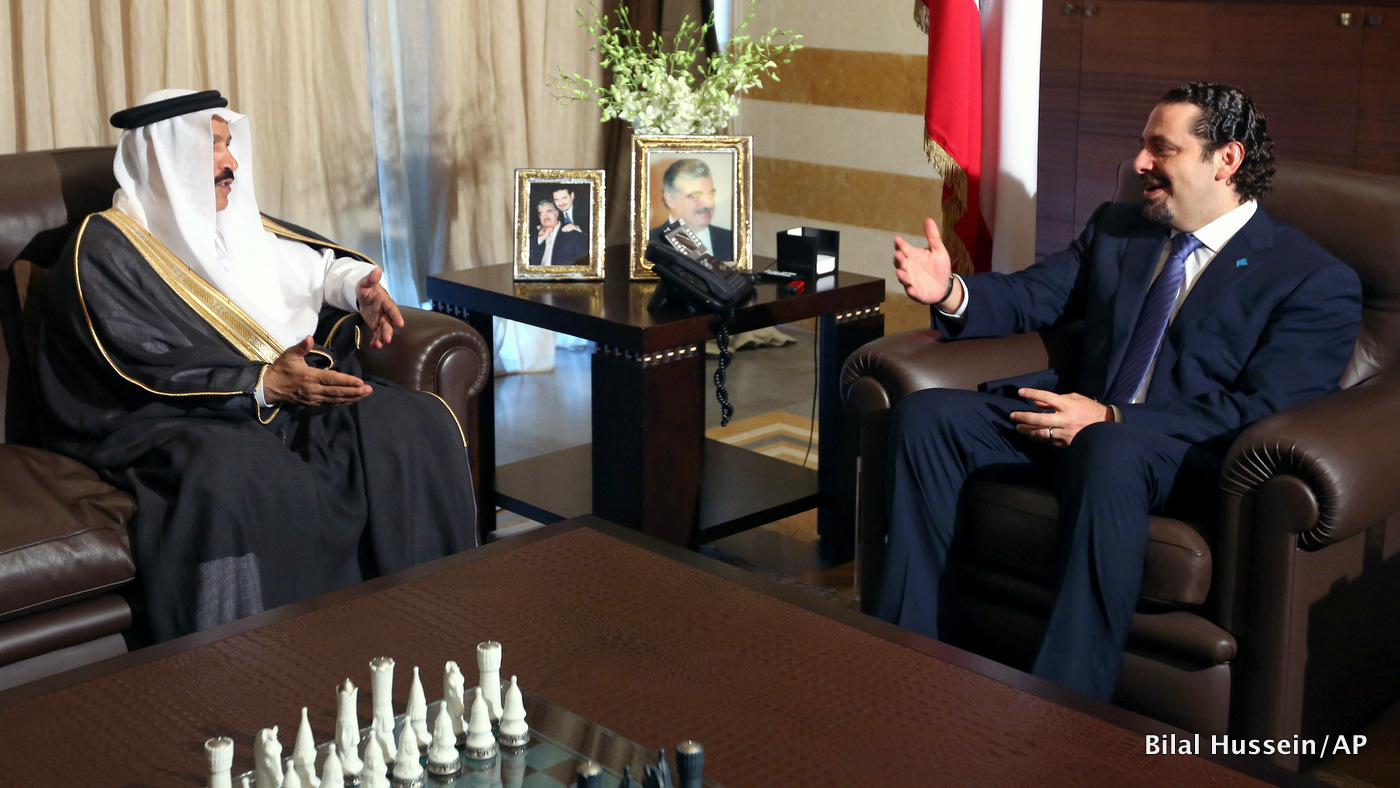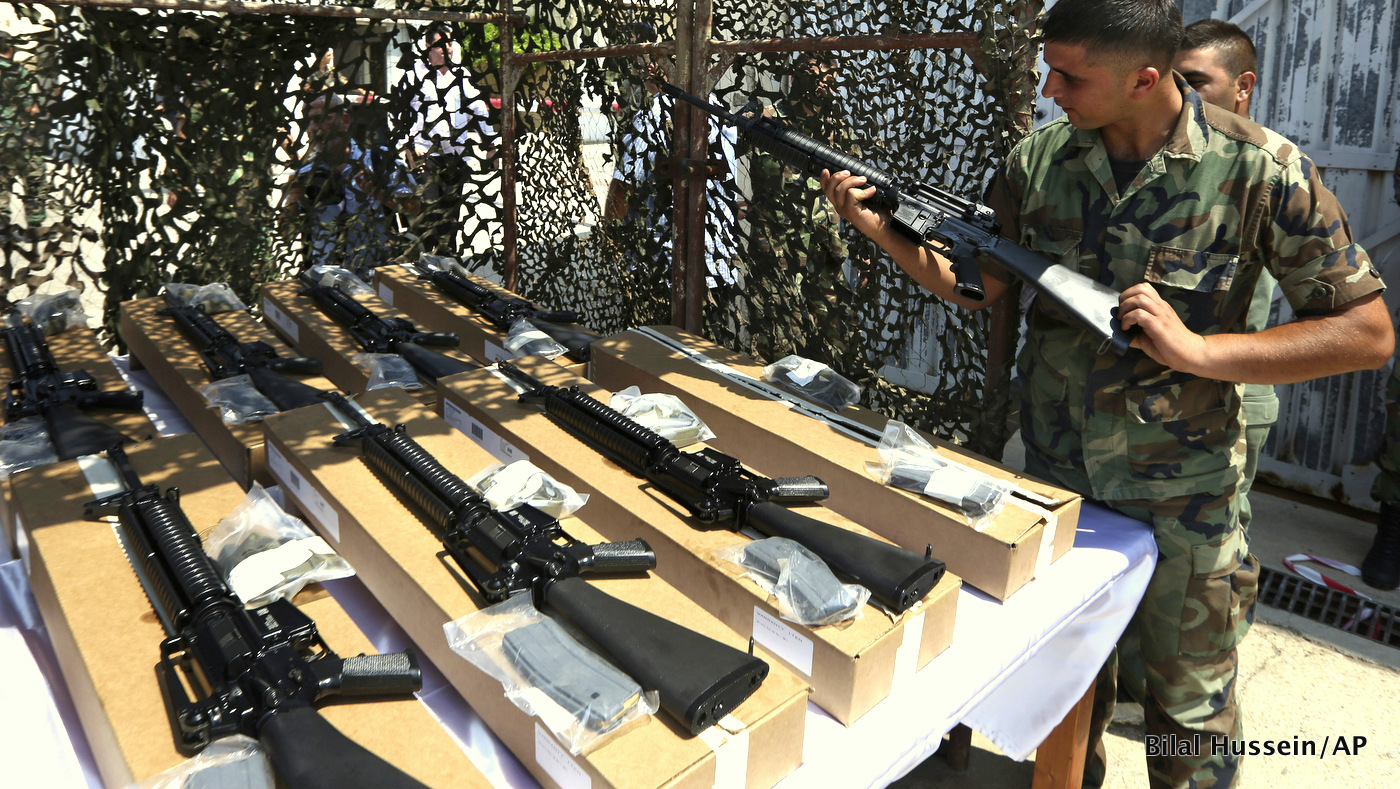 Former Lebanese Prime Minister Saad Hariri, right, meets with Saudi Ambassador Ali Awad Assiri at Hariri’s house in Beirut, Lebanon, Friday, Aug. 8, 2014. Hariri, considered Lebanonís most influential Muslim Sunni politician, returned unexpectedly to Lebanon Friday after three years of self-imposed exile. His return comes amid heightened tensions in Lebanon after Sunni extremists from Syria overran a town in the east, along the Lebanon-Syria border as well as the growing perception that there is a leadership gap among the country’s Sunni Muslims.
Former Lebanese Prime Minister Saad Hariri, right, meets with Saudi Ambassador Ali Awad Assiri at Hariri’s house in Beirut, Lebanon, Friday, Aug. 8, 2014. Hariri, considered Lebanonís most influential Muslim Sunni politician, returned unexpectedly to Lebanon Friday after three years of self-imposed exile. His return comes amid heightened tensions in Lebanon after Sunni extremists from Syria overran a town in the east, along the Lebanon-Syria border as well as the growing perception that there is a leadership gap among the country’s Sunni Muslims.
BEIRUT — Earlier this month, the Lebanese Armed Forces (LAF) received a shipment of arms and assistance worth $25 million from the United States. Meanwhile, France has announced that the first shipment in a $3 billion deal of Saudi-funded arms will arrive in the country in April.
From the outside, it looks like Lebanon’s preparing for war: either to fight Hezbollah within its borders, or to protect itself from extremist fighters like Jabhat al-Nusra (the Nusra Front) or the Islamic State of Iraq and Syria (ISIS) in Syria to the east or Israel to the south.
However, Hilal Khashan, director of the Political Studies department at the American University of Beirut, told MintPress News that this is not the case. Khashan says there is a good chance the $3 billion worth of French weapons won’t ever be delivered.
“All arms deliveries to Lebanon will have to be approved by the Israelis and the Americans,” Khashan said. “Nothing is allowed against Israeli reservations, and the Americans have to approve it.”
He gave as an example a Russian bid to sell fighter jets to Lebanon in 2010, which was scrapped due to Israeli objections.
Indeed, a WikiLeaks document from Jan. 6, 2010 states that the U.S. Ambassador to Lebanon Michele J. Sison was urged by then-Lebanese Defense Minister Elias al-Murr, to convince then-Prime Minister Saad Hariri to buy U.S. arms instead. The document does not say whether Sison heeded al-Murr’s advice, but the deal between Lebanon and Russia never panned out. There has been speculation that it did not go through in order to avert closer ties between Lebanon and Russia.
The U.S. has given over $1 billion in assistance to Lebanon since 2006, and Lebanon became the world’s fifth largest recipient of U.S. military assistance last year.
American arms
 A Lebanese army soldier inspects an American rifle at the Rafik Hariri International Airport in Beirut, Lebanon, Friday, Aug. 29, 2014. The United States has delivered the first shipment of weapons to Lebanon, funded mostly close U.S. alley Saudi Arabia.
A Lebanese army soldier inspects an American rifle at the Rafik Hariri International Airport in Beirut, Lebanon, Friday, Aug. 29, 2014. The United States has delivered the first shipment of weapons to Lebanon, funded mostly close U.S. alley Saudi Arabia.
The U.S. shipment included 70 M198 howitzers and millions of rounds of artillery. Yet as far as the American weaponry is concerned, Khashan reasons, “$25 million is nothing.”
The U.S. bolstered its economic and military assistance in Lebanon following Syria’s occupation of the country from 1976 to 2005, and after the 34-day Israel-Hezbollah War in 2006. To date, it’s invested over $1 billion toward the development of the Lebanese army.
Khashan told MintPress that the weapons provided by the U.S. can be used to shell extremist groups, such as ISIS and the al-Qaida-affiliated Nusra Front from a distance. For this reason, he says, the weapons are useful. For any other purposes, however, the weapons are “of limited utility,” he says.
“The French and the Americans do not really have deep faith in the Lebanese army,” he said, explaining that the French and the Americans are worried that weapons such as these could eventually fall into the hands of Hezbollah, a Shiite paramilitary group and Lebanese political party allied with Iran.
Khashan does not hold stock in this point of view, however, saying that the group would likely view those types of weapons as a “burden.” The reason for this, he explained, is that Hezbollah has traditionally engaged in “asymmetric warfare.”
“They don’t parade their weapons out in the street,” he said.
The asymmetric warfare that came to characterize the group and garnered national, regional and international attention, included staging suicide attacks, capturing soldiers, and allegedly bombing U.S. Marines in Beirut in 1982, which claimed 241 lives.
A miniature Middle East
Lebanon is seen as a kind of microcosm of the larger regional conflict playing out in the Middle East. The country is currently embroiled in a political crisis of legitimacy. It has not had a president since May 25.
Being a system based on sectarian identity, the president must be a Maronite Christian chosen by parliament with a two-thirds vote. However, the two parliamentary political blocs — the pro-Syrian President Bashar Assad March 8th alliance and the anti-Assad March 14th alliance — have not been able to agree on a candidate. The president has the power to implement and enforce laws, and ratify treaties.
Saudi Arabia supports the March 14th alliance, whose presidential candidate, Samir Geagea, vowed to disarm Hezbollah and force the group out of Syria, where it is fighting on behalf of Assad to rid the region of ISIS and the Nusra Front, groups which have threatened to enter Lebanon and fight Hezbollah on the basis that it is a Shiite group.
As Saudi Arabia supports some of the most extremist militant groups fighting Assad in Syria, the country views Hezbollah and its backer, Iran, as threats to Saudi interests in the region. These interests include assisting in the establishment of the Taliban-like so-called “Islamic State” based on Wahhabi-Salafist ideology.
Interestingly enough, however, the U.S. supported Michel Aoun, Hezbollah and the March 8th alliance’s candidate for president. A U.S. diplomat is reported as saying, “We are facing a clear equation, either Michel Aoun or chaos.”
Saudi machinations
Khashan does not believe that Western powers really want to empower the LAF. The Saudis, on the other hand, he explained, have separate motives.
“The idea behind the Saudi grant is different,” he said. “The idea is to empower the Lebanese army, and apparently the Saudis were thinking about a post-Hezbollah period in Lebanon.”
Saudi Arabia has been planning to destroy Hezbollah for years. According to a U.S. diplomatic document leaked by WikiLeaks, Foreign Minister Prince Saud Al-Faisal proposed in 2008 that an “Arab force” should be set up in Lebanon to “battle” Hezbollah and Iran. The proposal was proffered to then-U.S. Ambassador to Saudi Arabia David Satterfield during a meeting with the prince.
The document states:
“Saud first turned to Lebanon and stated that the effort by ‘Hizballah and Iran’ to take over Beirut was the first step in a process that would lead to the overthrow of the Siniora government and an ‘Iranian takeover of all Lebanon.’ Such a victory, combined with Iranian actions in Iraq and on the Palestinian front, would be a disaster for the US and the entire region.”
This came three years after the assassination of Prime Minister Rafic Hariri, a Sunni Muslim, whose party, the Future Movement, is supported by Saudi Arabia. An international criminal tribunal investigating his death indicted four members of Hezbollah on allegations that they were responsible for the assassination. Hezbollah and its Al-Manar TV have stated that the tribunal is “politicized,” and deny being behind the assassination.
In a damning indictment of American allies in the Middle East, which presumably includes Saudi Arabia, U.S. Gen. Wesley Clark (Ret.) told CNN that ISIS was created by U.S. allies to fight Hezbollah:
“ISIS got started through funding from our friends and allies because as people will tell you in the region, if you want somebody to go and fight to the death against Hezbollah, you don’t put out a recruiting poster and say, ‘Sign up for us. We’re going to make a better world.’ You go after zealots and you go after these religious fundamentalists. That’s who fights Hezbollah.”
“It’s like a Frankenstein,” Clark asserted.
The Saudi grant to Lebanon includes provisions for sea, land and air equipment. Khashan told MintPress that the Saudis are going to be sorely disappointed, however, because the role of the LAF has always been for internal security and it will not fight a Lebanese group.
“This has been the mission of the Lebanese army ever since the early 1950s,” he said. “It’s not written, you know, but the policy of the army since Fouad Chéhab [the first commander of the LAF, and president from 1958 to 1964] … was to act as an arbitrator and as a conflict mediator.”
Mohammad Ballout, a Paris-based journalist for Lebanon’s As-Safir newspaper, echoed Khashan’s remarks in an article about the Saudi-French arms deal. He wrote that the Gulf state is “ignoring the depth of the relationship between the Lebanese army and Hezbollah and the great mutual trust between the two sides.”
Another important factor for understanding weapons sales to Lebanon, Khashan says, is that “no matter what the French give the Lebanese, the army will never be in a position to confront Israel.” He added, “No matter what they give them, they will never be in a position to confront any regional army.”
In terms of the limited role of the Lebanese army as a force for internal security, he concluded, “We do not even need the howitzers.”
Khashan believes the Lebanese army’s current set-up is sufficient, even to repel rebel groups in the east.
Eerily, however, and in possible contradiction to his claim, it was reported this month that ISIS has set up a Sharia court in the Lebanese border town of Arsal, which was invaded in August. The group beheaded Lebanese soldiers following the August attack.

